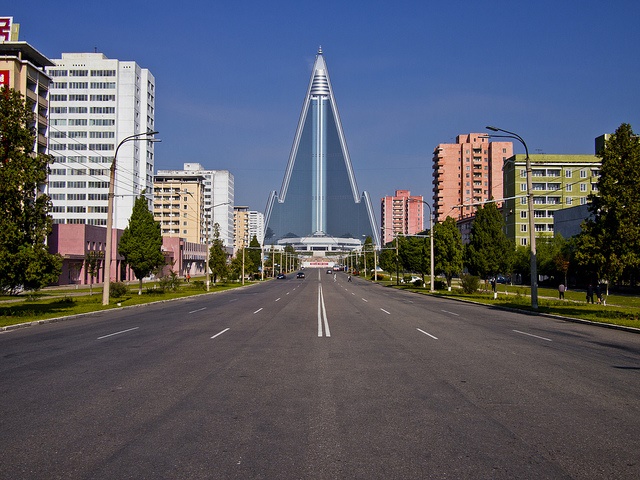The Peninsula
A Balanced Approach to North Korea
Published April 1, 2015
Category: North Korea

By Matthew Nitkoski
According to former National Assembly Speaker Park Kwan-yong, the United States will soon turn away from its North Korea denuclearization strategy and focus on nuclear non-proliferation issues. His comments come at a time when North Korean advancements in warheads and delivery mechanisms are forcing regional states to reassess their capabilities and reconsider their long-standing defensive arrangements. According to Park, a former Saenuri Party official and presidential chief of staff, it will soon be impossible for the U.S. to launch a military attack on a nuclear-armed North Korea without facing a retaliatory strike. Although Washington has not signaled any intended shift in foreign policy, the rapidly changing East Asian security environment and the failure of current strategies necessitate a recalibration of the current U.S. position on North Korea.
Since 2009, the United States has utilized economic sanctions, international isolation, and joint military exercises in an attempt to force Pyongyang to forego nuclear weapons development. While this stance has strained North Korea’s economy and severely limited its choices of trading partners, it has done little to halt the regime’s inexorable march towards obtaining advanced nuclear warheads and delivery mechanisms. North Korea currently possesses short and intermediate range ballistic missiles that can strike most major cities in Northeast Asia and experts estimate that it has somewhere between four and eight nuclear weapons in its stockpile. In addition, U.S. military planners have warned of an advanced long-range missile program that, once completed, will allow the regime to target cities on the West Coast of the United States.
The U.S. has responded to these developments by urging South Korea to join its ballistic missile defense system. The Terminal High Altitude Area Defense system, better known as THAAD, would act as a deterrent against any nuclear attacks aimed at South Korea, but would do little to discourage Pyongyang from continuing its military modernization. The proposed U.S. led missile defense system, coupled with current isolation tactics and sanctions, provide little incentive for North Korea to abandon its weapons programs and reengage in six-party talks. With Pyongyang steadily moving ahead with its weapons programs and nuclear advancements, the U.S. must couple diplomatic overtures with its hard line stance in order to coax North Korea into approaching the negotiating table.
While the missile defense system is ostensibly aimed at deterring North Korea, the proposed THAAD system is also unsettling South Korea’s neighbors. Seoul and Beijing have enjoyed improved relations since President Park Geun-hye’s election in 2013, but the missile defense system presents a potential stumbling block for their relationship. China is concerned that a missile defense system placed in South Korea would limit the PLA’s ability to project power and influence into the East China Sea. Additionally, many within China view THAAD as yet another U.S. attempt to exert regional hegemony and contain Chinese military power. The Blue House insists that Washington is not pressuring it to deploy the advanced missile defense system, but there is clearly a growing divide within Korea over how to deal with increasing North Korean capabilities. Beijing is not content to stand by idly, and reports indicate that China may be offering South Korea improved trade and business deals in exchange for Seoul’s rejection of THAAD deployment.
Clearly, security issues are a top priority for South Korea and the United States, yet the tough, hardline approach towards the North Korean nuclear program has not increased regional security or reined in Pyongyang’s ambitions. Unless the U.S. can force Kim Jong-un into making credible concessions and commitments to safeguarding nuclear material and limiting nuclear developments, regional governments will be forced into making tough security decisions to guarantee their own safety. While South Korea and Japan have foresworn developing nuclear weapons, China’s growing power and North Korea’s nuclear program could provide ample impetus for starting domestic nuclear programs. This situation currently seems far fetched and unlikely, but regional governments must take into consideration what could happen to Pyongyang’s arsenal if the government collapsed or lost control.
The above evidence suggests that Washington needs to rebalance its approach to North Korea, however, President Obama’s recent comments concerning totalitarian regime collapse indicate that the White House still favors a hardline towards the rogue state. Indeed, the president’s statement did more to reveal the White House’s uncertainty about North Korea than to allay key allies’ security concerns. With the president acknowledging that the U.S. has nearly exhausted its repertoire of economic sanctions, Washington needs to consider alternative measures.
The U.S. must utilize a new set of diplomatic and economic tools along with strict security measures in order to encourage North Korea to accept some limits on its nuclear program. Park Kwan-yong’s recent statement is a realistic appraisal of North Korea’s nuclear and technological developments. North Korea seeks begrudging acceptance as a nuclear power much like Pakistan did in the 1970s and 80s, and, with Pyongyang pushing ahead with development and production, the U.S. must alter its tactics and accept that coercion will not deter Kim Jong-un from nuclear developments.
THAAD and annual military drills are important for regional security, but Congress should take note of the important progress made in nuclear discussions with Iran and improving relations with Cuba. The current policy of “strategic patience” has not halted North Korean nuclear development, and the U.S. should offer some concessions to coax Pyongyang back to the negotiating table. An isolated, nuclear armed Kim regime is a grave threat to security, and bringing rogue states back into the international order should be the top priority for the U.S. and its allies.
Matthew Nitkoski is a MA candidate in International Affairs at the Elliot School for International Affairs at George Washington University and an intern at the Korea Economic Institute of America. The views expressed here are the author’s alone.
Photo from Marcelo Druck’s photostream on flickr Creative Commons.
